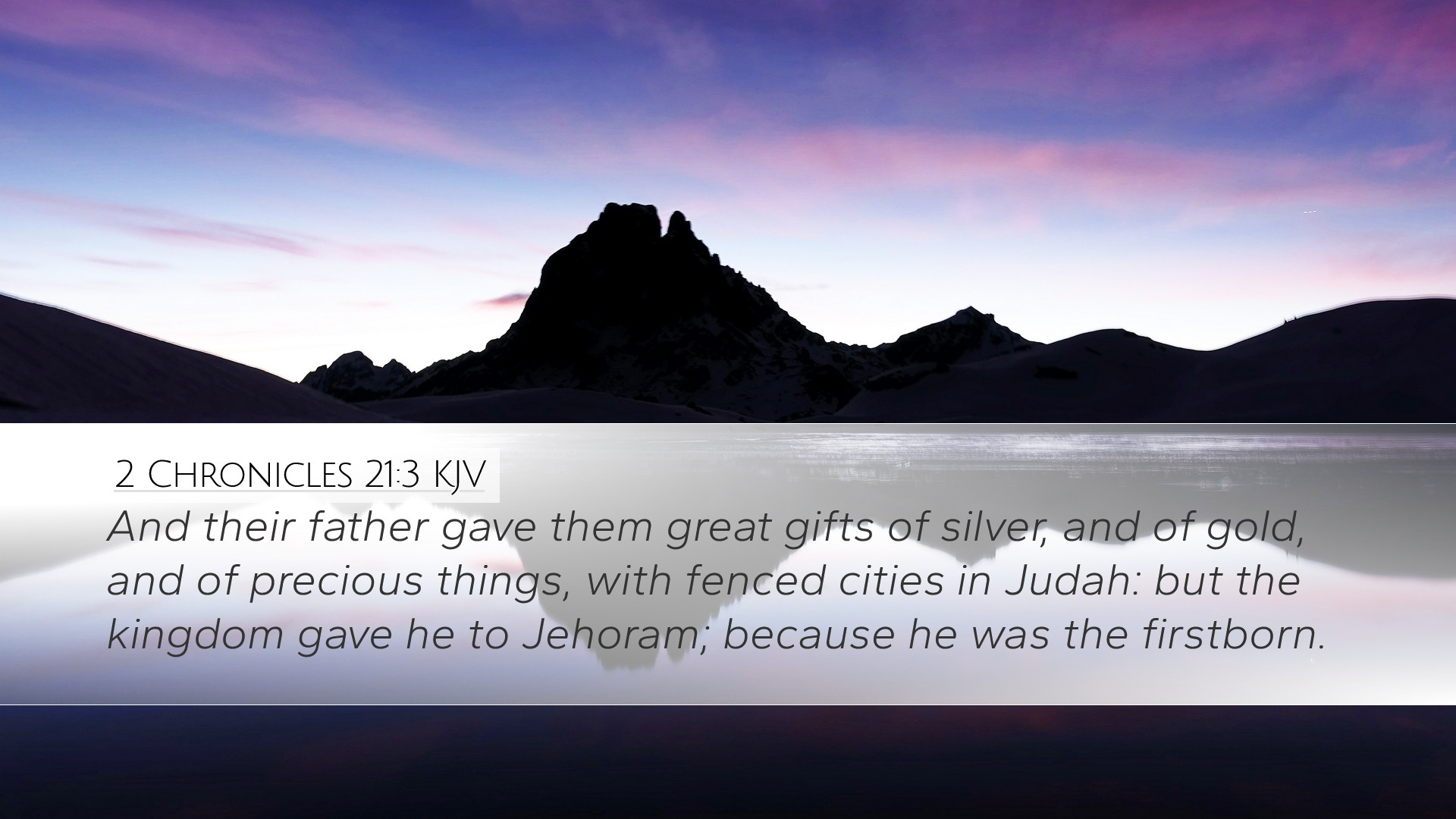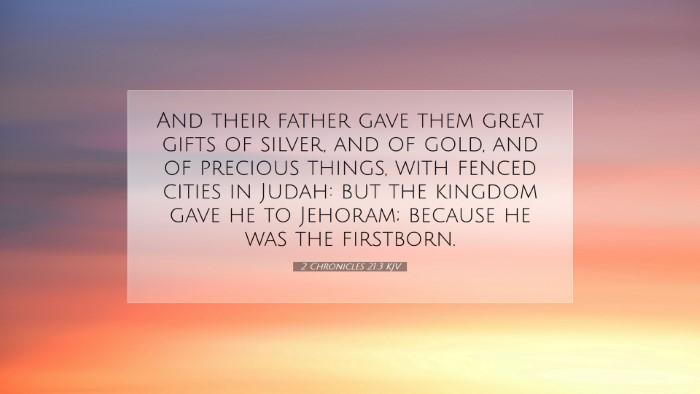Commentary on 2 Chronicles 21:3
2 Chronicles 21:3 states:
"And their father gave them great gifts of silver, and of gold, and of precious things, with fenced cities in Judah: but the kingdom gave he to Jehoram; because he was the firstborn."
Introduction
This verse captures a significant moment in the succession of leadership in Judah, revealing not only a father's affection for his children but also the political and spiritual implications of the distribution of wealth and power. The insights from classic Biblical commentaries provide a rich understanding of the context and ramifications of this verse for the Israelite monarchy and the overarching narrative of Judah’s history.
Insights from Matthew Henry
Matthew Henry emphasizes the paternal role of Jehoshaphat, who, in his wisdom, made a generous provision for all his sons. In a time when leadership could lead to bitter enmity among siblings, Jehoshaphat’s act of benevolence is highlighted as an effort to secure peace and stability within the family. However, Henry points out the potential pitfalls of such wealth:
- Wealth and Responsibility: The gifting of 'great gifts of silver and gold' represents not merely material prosperity but comes with the responsibility of stewardship. Pastors and scholars alike must reflect on how wealth can both elevate and complicate one's spiritual life.
- Favoritism and Succession: By giving the kingdom to Jehoram, the firstborn, it demonstrates the traditional right of primogeniture. However, this may incite jealousy in the hearts of his brothers, revealing the tension between divine choice and human politics.
Insights from Albert Barnes
Albert Barnes expounds on the historical context of this passage, noting that Jehoram’s ascension is closely tied to the traditions that governed royal succession. Barnes suggests that Jehoshaphat’s actions can be seen as pragmatic, as he attempts to consolidate power and avoid conflict:
- Strategic Leadership: Barnes highlights that the distribution of fenced cities to the other sons signals preparedness for any potential revolt. This foresight reflects the importance of strategic planning that leaders must undertake to maintain stability.
- Implications for Leadership: Jehoram's elevation to the throne, despite his moral failings as noted later in the text, serves as a cautionary tale about the impact of lineage and familial ties over personal merit in positions of power.
Insights from Adam Clarke
Adam Clarke provides a detailed exploration of the implications of Jehoshaphat's actions, pointing out that his intent was not to favor Jehoram at the expense of his other sons. Instead, Clarke elucidates on the socio-political necessity behind the decisions:
- Fatherly Intent: Clarke notes that Jehoshaphat undoubtedly intended for the gifts to be a blessing, ensuring that his sons would remain influential within the kingdom without encroaching upon the throne's authority.
- Long-term Consequences: There is a foreshadowing of Jehoram's eventual failure, which serves as a commentary on how the royal lineage is not guaranteed to produce righteous leadership. This invites reflection on divine sovereignty versus human election where God’s plans transcend human designs.
Theological Reflections
The distribution of wealth and power outlined in this verse opens theological avenues regarding God’s providential care in governance. For pastors and theologians, several reflections may arise:
- Paternal Guidance: The nature of parental influence in shaping leadership reflects God’s role as a Father. It invites discussion on how worldly leadership mirrors God's spiritual guidance.
- Wealth as a Tool: The verse provokes questions regarding the use of wealth in promoting justice and righteousness within a community. How can leaders today view their resources as tools for benevolence rather than instruments of division?
- Divine Sovereignty: The selection of Jehoram, despite his shortcomings, underscores the tension between divine foreknowledge and human failure. The theological implications of God’s choices in the face of human error can be deeply explored in sermons and teachings.
Conclusion
2 Chronicles 21:3 serves as a profound commentary on the dynamics of leadership, familial loyalty, and the moral responsibilities that come with power. Leveraging insights from Matthew Henry, Albert Barnes, and Adam Clarke invites a deeper reflection on the themes of governance, wealth distribution, and the overarching narrative of divine providence throughout the Scriptures. For pastors, students, and scholars, this verse acts as a reminder of the complexities of leadership and the importance of aligning one’s actions with God’s will.


